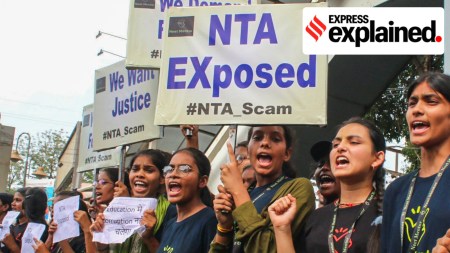
RECALLING 2015, WHEN SC CANCELLED THE MEDICAL ENTRANCE EXAM TO ‘MAINTAIN SANCTITY AND CREDIBILITY OF THE PROCESS’
NEET-PG 2024, the examination for admission to postgraduate programmes in medicine in government and private colleges, has been put on hold, and there is increasing clamour from students and opposition parties for cancelling NEET-UG as well.
The results of NEET-UG, the entrance exam for undergraduate medical, dental, and AYUSH courses that was held on May 5, were declared on June 4. An unusually high number of 67 candidates maxed the exam, and the National Testing Agency (NTA) has since announced a re-test for 1,563 candidates who were given ‘grace marks’ for ‘loss of time’.
Multiple lawsuits are pending against the exam in the Supreme Court and High Courts, investigators in Bihar have found “clear suggestions of a paper leak”, the NTA chief has been moved out, and the CBI has been told to investigate the allegations of irregularities.
Education Minister Dharmendra Pradhan has said that candidates who took the exam, including those from rural areas, should not be made to suffer for “some isolated incidents”. However, if the exam is indeed cancelled, it would not be the first time that a re-test would be held for admission to medical colleges. In 2015 the All India Pre-Medical/Pre-Dental Test (AIPMT), the predecessor of NEET-UG, was cancelled on the orders of the Supreme Court.
What happened with the medical entrance test in 2015?
The NTA was established only in November 2017, the AIPMT was conducted by the Central Board of Secondary Education (CBSE). In 2015, more than 6 lakh candidates sat for the exam on May 3 at 1,050 centres across the country. On June 15, 2015, the Supreme Court cancelled the exam and directed that the re-test be conducted within four weeks.
A Bench of Justices R K Agrawal and Amitava Roy noted that the “abrogation of the examination would result in some inconvenience to all concerned and that some extra time would be consumed for holding a fresh examination with renewed efforts therefor”; “however,…this is the price the stakeholders would have to suffer in order to maintain the impeccable and irrefutable sanctity and credibility of a process of examination, to assess the innate worth and capability of the participating candidates...”.
The exam was held again in July.
But why was the examination cancelled?
Petitions before the Supreme Court in May 2015 pointed to the use of electronic devices by candidates to access answer keys, and asked for the exam to be cancelled on those grounds.
The Haryana Police told the Supreme Court in its status reports that while the AIPMT was under way, it received information about four people being involved in leaking an answer key to the question paper and circulating it to candidates in return for payment. In Rohtak, the police intercepted a car with four suspects, and found vests “tagged with micro SIM” and bluetooth devices. Answer keys were found on some of their phones.
The police told the court that 44 candidates were found to be “confirmed beneficiaries” – they were supplied with answer keys during the examination through electronic devices installed in their vests.
The Supreme Court noted that the then Inspector General of Police, Haryana, had “submitted that the investigation in full swing is in progress and that undoubtedly many more beneficiaries of the plot would be identified at the earliest… He frankly admitted as well, that in the process it might not be possible to identify each and every beneficiary of the malpractice perpetrated.”
What position did the CBSE take before the Supreme Court?
The CBSE said that there was no omission or lapse on its part, and that it had taken the necessary precautions while making arrangements for the “smooth and fair conduct” of the examination.
It said that holding a fresh examination would result in a delay in all the subsequent stages, could impact the academic session and the prospects of the candidates, and that it would need at least 120 days to hold a fresh examination.
Counsel for CBSE also said that only 44 “beneficiaries” of the alleged “deceitful operation” were identified, and the whole process cannot be construed to have been invalidated.
On what grounds did the Supreme Court cancel the exam?
The court said that while 44 candidates were identified as having benefited from the malpractice, “it is not unlikely that many more candidates have availed such undue advantage”. Segregation of the identified 44 candidates cannot be the solution, it said.
“We are conscious of the fact that every examination being conducted by a human agency is likely to suffer from some shortcomings, but deliberate inroads into its framework of the magnitude and the nature, as exhibited, in the present case, demonstrate a deep seated and pervasive impact, which ought not to be disregarded or glossed over… If such an examination is saved, merit would be a casualty generating a sense of frustration in the genuine students…,” the order stated.
The court added that the examination stood “denuded of its sanctity” since it cannot be “cleansed” of all beneficiaries of the malpractice “with certainty”.
For the latest news from across India, Political updates, Explainers, Sports News, Opinion, Entertainment Updates and more Top News, visit Indian Express. Subscribe to our award-winning Newsletter Download our App here Android & iOS
2024-06-23T13:25:22Z dg43tfdfdgfd